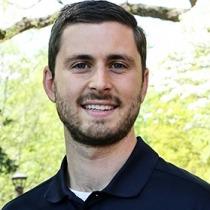
Brian Eberle
What is your next adventure?
I am moving to Boston to take a position with Draper Laboratory as a senior GNC [guidance navigation and control] analyst. I never interned there or co-opped, but they liked what I presented. I interviewed there remotely.
What about your next adventure are you most looking forward to?
I'm motivated by the technology I'll get to work on -- either an autonomous un-manned space shuttle or the human lander, a vehicle that will be used on the moon. I don't know which, yet, but, hey, I can't argue with those choices. At Tech I studied rotorcraft autonomy and handling - an experience that helped me to develop control experiments and flight dynamics experiments. As I was ending my degree, I took a step back to think about what I wanted to do, post-grad, and spacecraft controls just grabbed me. And the thing is, having a strong aerospace engineering controls background made me more attractive to Draper, so I'm getting a chance to explore an area that's very exciting to me.
Did you have any previous co-op, internship, or research experience in this area?
As an undergraduate at Tech, I did three rotations as a co-op with GE Aviation - one in New York, another in Massachusetts, and another in Ohio. I was working as a design engineer for a military jet engine. My biggest take-away from that experience was that the people who had the jobs I wanted to do all had advanced degrees.
While I was co-opping one semester, I was in a preliminary design role where we worked on a theoretical engine. At the time, I did a design study that I knew would have an impact on what engine GE would bid for the next generation air dominance vehicle. Of course, I was guided by engineers with master's and Ph.D.s and they were carrying the weight. But working on a project that would drive novel technology advances, well, that really got to me.
As a graduate student, I got to do research with Dr. [Jonathan] Rogers, who, like me, has a pilot's license. From the moment we met, we had a mutual respect for the knowledge and intuition we each brought to flight dynamics as pilots. And that respect led him to place me into research that would challenge my knowledge and passions. I focused on auto rotation- a maneuver that is performed in the event of engine failure in a helicopter. I was developing algorithms to automate the maneuver and developing pilot cues that would help the human pilots land the vehicle safely.
How did your educational experience at Georgia Tech help you to achieve your goals?
Tech provided me with an environment that was full of tremendous people -- faculty who encouraged me to think bigger, to dream bigger. And they believed in challenging me. I definitely lowered my head and plowed through a lot of very challenging material.
The other thing Tech did was it opened up international study. I studied abroad at GT Lorraine, and also in Germany (I minored in German). Studying abroad really opened up my world, and, again, it made me dream bigger. When I went to France, it inspired me to pick up the German language again - I'd studied it high school. If you learn another language you can experience a whole other world, another culture. That just changes how you see yourself and your own dreams. You can't help but dream bigger.
What advice would you give to an underclassman who would like to follow the same path?
We talk a lot about the doors that Tech opens, and that's really true. What I would add to that is this: you have to decide what you want to do with those opportunities and consider what you need to do to make your dreams happen. That means you take the time, step back, and reflect on what you, personally, want to make of all the opportunities that you'll have.
For me, when I came to Tech, I didn't know what I wanted to do. I didn't know how to define what success would mean for me. I started out in mechanical engineering, and, as an undergraduate, I would have been happy to end up working for a gravel company. But along the way, I began to ask myself which of the opportunities I was offered really fit me. That gave me the direction I needed to work all the way through to a Ph.D. I would advise anyone to take the time to do the same.